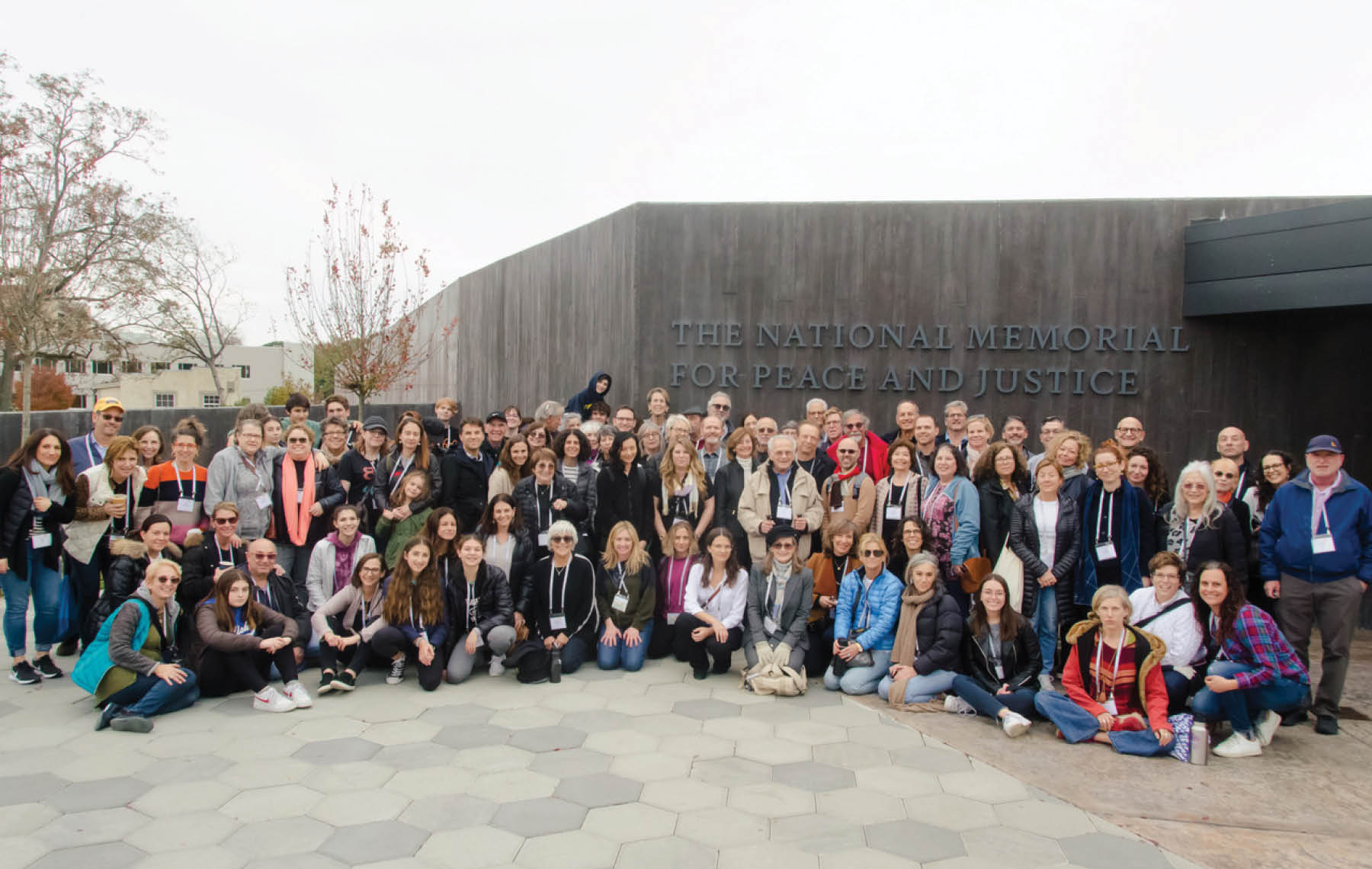 108 IKARites made the pilgrimage to Montgomery, Ala., to learn the stories of human suffering inflicted in our own country and stand on sacred ground under the weight of history. Photos by Kim Silverstein
108 IKARites made the pilgrimage to Montgomery, Ala., to learn the stories of human suffering inflicted in our own country and stand on sacred ground under the weight of history. Photos by Kim Silverstein Editor’s note: On Nov. 17, members of IKAR traveled with Rabbi Sharon Brous to Montgomery, Ala. These two pages are reflections from that trip — one by an adult, Adam Wergeles, and the other by teenager Ezra Golub.
On the weekend of Nov. 17, I went with my synagogue, IKAR, to Montgomery, Ala., to learn about our country’s history of racial slavery, lynching and the modern criminal justice system.
We visited the Legacy Museum and the National Memorial for Peace and Justice, and met with Bryan Stevenson, founder of the Equal Justice Initiative (EJI), the organization that created the museum and memorial. EJI is a nonprofit organization providing legal representation to those who have been illegally convicted, unfairly sentenced or abused in state jails and prisons.
The museum and memorial bear witness to the horrific racial violence carried out during the time between the Civil War and the civil rights movement, but what spoke to me the most were the stories of people who have undergone the same kind of racial injustice in modern times under our legal system.
The story of Anthony Ray Hinton was particularly shocking and emotionally powerful to me. In 1985, Hinton was 29 and living with his mother just north of Birmingham. One day, two white detectives came to his house and charged him with two separate murders. Hinton insisted he was innocent. The detectives listed five reasons why it didn’t matter: a white jury, a white judge, a white prosecutor, a white witness and Hinton’s black skin.
They were correct. Despite a lack of verifiable evidence, Hinton was sent to death row, where he remained in solitary confinement for 30 years. Fourteen years into his sentence, Stevenson and the EJI took his case. It took another 16 years before the Supreme Court overturned his conviction, after reviewing the same evidence the state had refused to consider.
I asked Stevenson about his work with juvenile offenders and he reminded us of something very important: They are kids just like us. I think this is something that sounds obvious when stated so plainly, but within our criminal justice system, it seems to be completely ignored.
Hinton described his ordeal, saying, “They took off the white robes and put on the black ones.” To me, that quote is the connection between the system of racial terror enforced by lynching and the way it is now, completely institutionalized and done through our criminal justice system. What happened to Hinton was a lynching. He was an innocent black man in a court where a white “witness” called him a murderer, a white prosecutor argued he was guilty, a white jury confirmed his guilt, and a white judge sentenced him to death.
It is nice to think that as children and teenagers, people my age are safe from this kind of injustice, but sadly, that isn’t true. I asked Stevenson about his work with juvenile offenders and he reminded us of something very important: They are kids just like us. I think this is something that sounds obvious when stated so plainly, but within our criminal justice system, it seems to be completely ignored. Thirteen states still do not have a minimum age requirement for trying someone as an adult. And when kids are tried as adults, terrible things happen.
Joe Sullivan was only 13 when he was falsely accused of raping an old woman. His public defender did nothing to stop the state from trying him as an adult. He received a life sentence in a Florida prison. Sullivan was sent to an adult prison when he was just 14, where older inmates repeatedly and brutally victimized him. He was released 25 years later. If we had treated Sullivan as a child − which he was − he wouldn’t have been subjected to 25 years of trauma. As a teenager, it is hard to imagine myself being sentenced to more years in prison than I have been alive. It is unfathomable that our system could condemn young people for the rest of their lives.
Stevenson said that when his clients are teenagers, he sends them books to read and discuss in future visits. Hearing this both warmed and shattered my heart. It is encouraging he is using books as a way to open up the world and build human connection for kids who have been ripped out of school and locked up. But even more than that, it created a searing image of the humanity of people my age and even younger behind bars, reading books just like me. It was a stark reminder that they think, feel and can be easily influenced by someone caring about them. Teenagers are not particularly well known for their decision-making capabilities. It is terrifying to know that a bad decision one of my friends or I could make might result in years spent in prison based on our skin color.
I learned so much on this trip about the history of racial injustice in America and the way it persists to this day. My biggest takeaway is that lynching isn’t gone; it has been institutionalized. Because it is people of color in our generation who are suffering right now from modern lynching, it is our generation’s responsibility to end it.
Ezra Golub is a junior at North Hollywood High School.




















 More news and opinions than at a Shabbat dinner, right in your inbox.
More news and opinions than at a Shabbat dinner, right in your inbox.